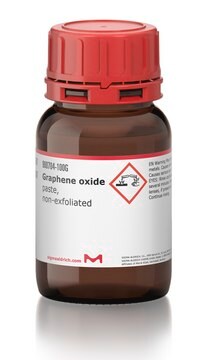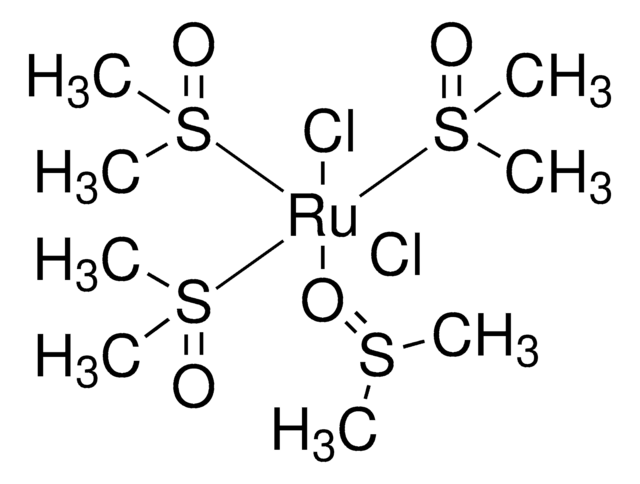84050
Ruthenium(III) chloride hydrate
38.0-42.0% Ru basis
Synonyme(s) :
Ruthenium trichloride
About This Item
Produits recommandés
Forme
powder
Pertinence de la réaction
core: ruthenium
reagent type: catalyst
Concentration
38.0-42.0% Ru
Chaîne SMILES
O.Cl[Ru](Cl)Cl
InChI
1S/3ClH.H2O.Ru/h3*1H;1H2;/q;;;;+3/p-3
Clé InChI
BIXNGBXQRRXPLM-UHFFFAOYSA-K
Vous recherchez des produits similaires ? Visite Guide de comparaison des produits
Application
- Photocatalytic disinfection: A study highlighted the synthesis of silver-ruthenium bimetallic zinc oxide nanocomposites using Callistemon viminalis leaf extract. These nanocomposites demonstrated effective photocatalytic disinfection properties against Escherichia coli, presenting a promising application in antimicrobial coatings (Jha et al., 2024).
- Photoelectrocatalysis for hydrogen production: RuO(2)/TiO(2) heterostructures were investigated for their potential in photoelectrocatalytic hydrogen evolution, combining experimental and theoretical approaches to highlight the efficiency of ruthenium-based materials in renewable energy technologies (Kaikhosravi et al., 2023).
- Electrochemical applications: The study explored the electrochemical properties of mixed RuOx/MnOx electrodes, prepared by thermal decomposition from different precursors, showing significant implications for their use in energy storage and conversion systems (Petrucci et al., 2022).
- Catalysis and electrocatalysis: Unprotected and interconnected Ru(0) nano-chain networks were examined for their advantages in catalysis and electrocatalysis, illustrating the benefits of unprotected surfaces for improved reaction kinetics and efficiency (Anantharaj et al., 2016).
Autres remarques
Mention d'avertissement
Danger
Mentions de danger
Conseils de prudence
Classification des risques
Acute Tox. 4 Oral - Aquatic Chronic 2 - Eye Dam. 1 - Skin Corr. 1B
Code de la classe de stockage
8A - Combustible corrosive hazardous materials
Classe de danger pour l'eau (WGK)
WGK 3
Point d'éclair (°F)
Not applicable
Point d'éclair (°C)
Not applicable
Équipement de protection individuelle
Eyeshields, Faceshields, Gloves, type P3 (EN 143) respirator cartridges
Faites votre choix parmi les versions les plus récentes :
Déjà en possession de ce produit ?
Retrouvez la documentation relative aux produits que vous avez récemment achetés dans la Bibliothèque de documents.
Les clients ont également consulté
Notre équipe de scientifiques dispose d'une expérience dans tous les secteurs de la recherche, notamment en sciences de la vie, science des matériaux, synthèse chimique, chromatographie, analyse et dans de nombreux autres domaines..
Contacter notre Service technique













